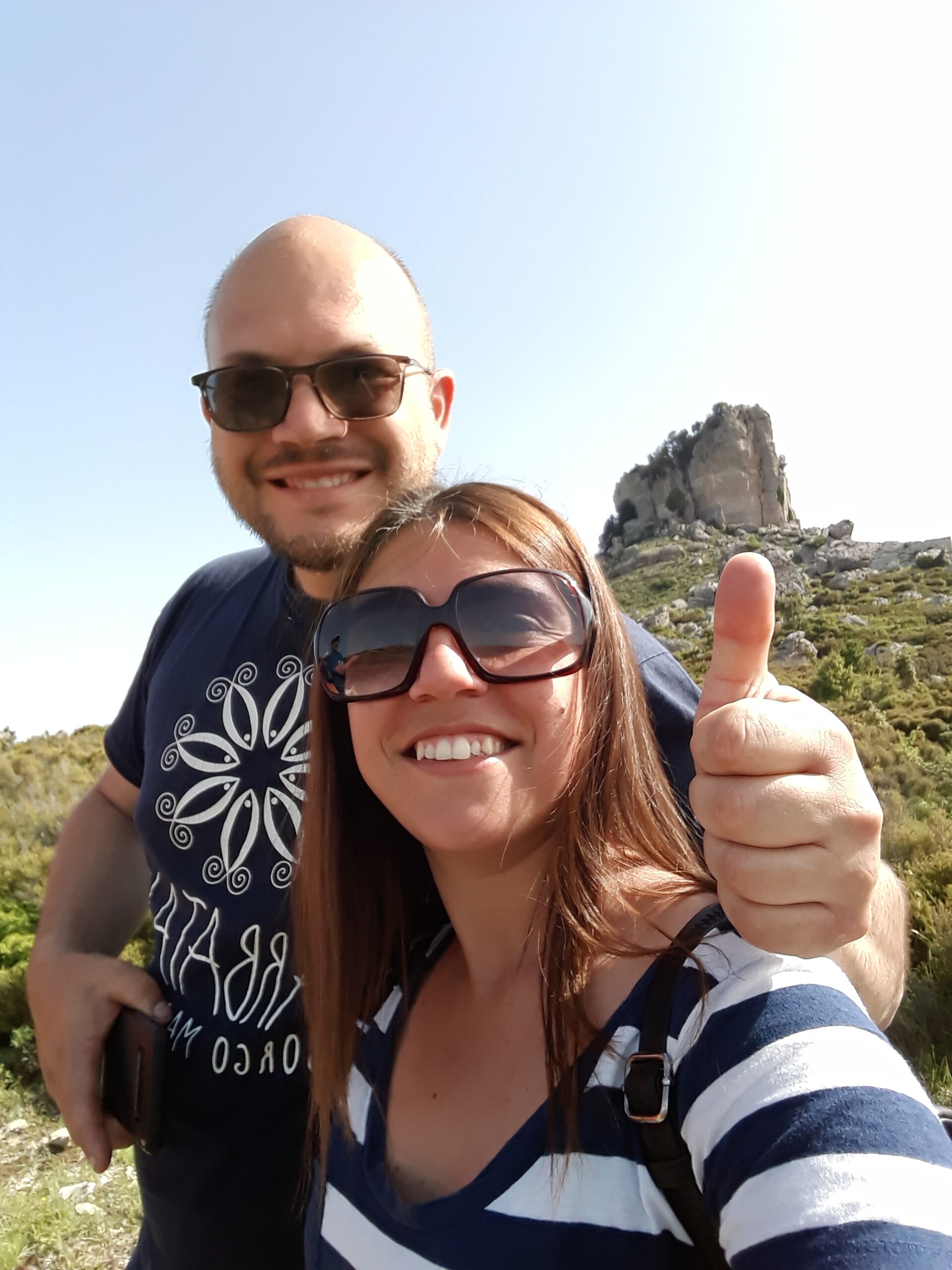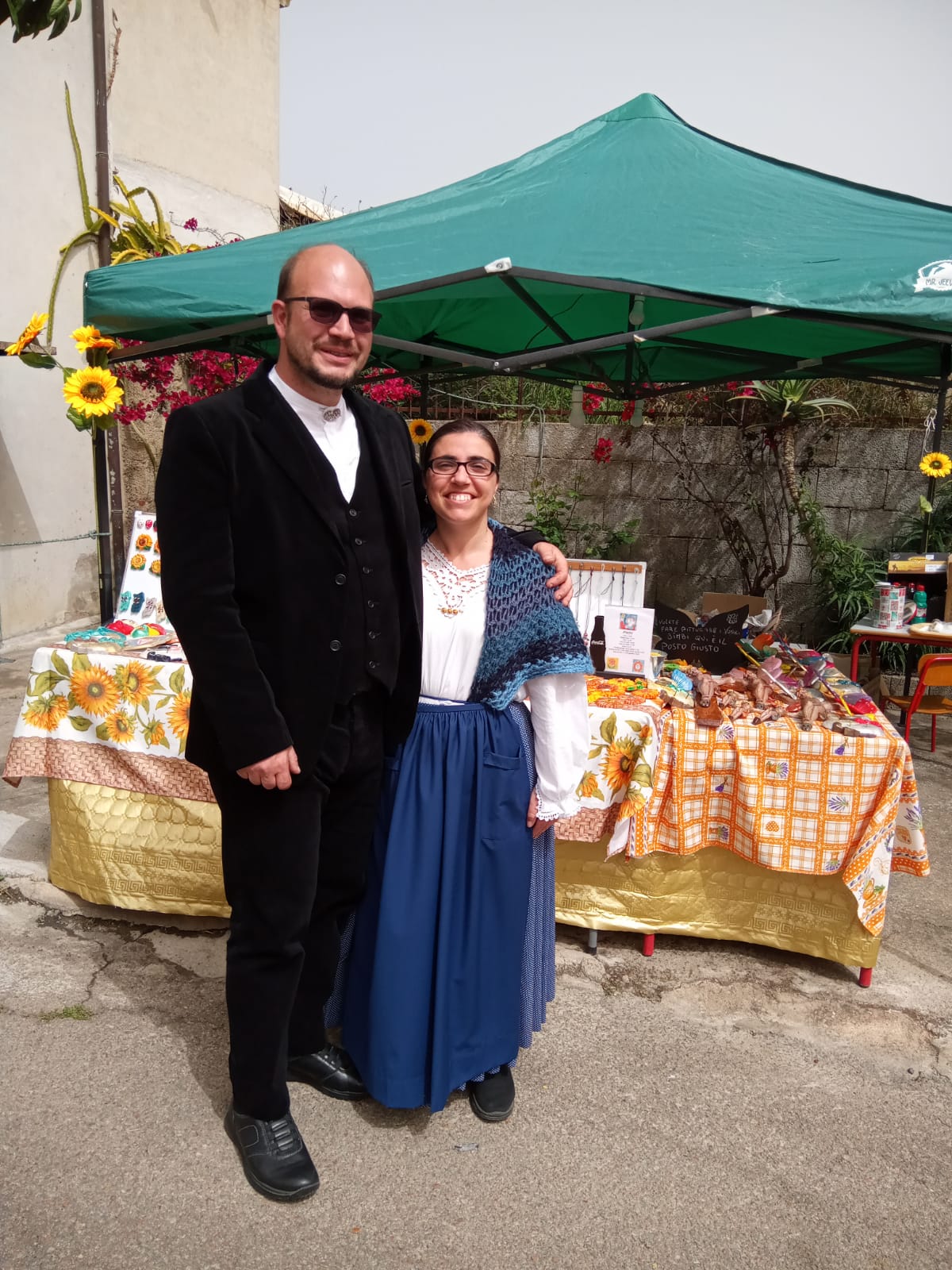
Stefania Demurtas
Stefania is originally from Arbatax. Having graduated as an accountant in 2010, she started to take care of the family farm in 2012. In 2015, she attended the 200-hour course “Acquisition of new skills in agriculture and multifunctionality of farms”, doing an internship at the Chiai farm in Barisardo. She ran the farm producing mainly fodder crops until she met Salvatore, who was already producing wheat in his own farm. In 2018, she reintroduced durum wheat Cappelli on her farm, reviving the tradition abandoned by her grandfather. In the same year, she attended the 72-hour course “Planning in Permaculture” together with Salvatore and started frequenting the Seed House of Sardinia. In 2018, she actively participated in the founding of the Slow Food Ogliastra convivium. In 2020, she attended Giancarlo Cappello’s “Elementary Agriculture” course. During September 2021, April 2022, and September 2022 she was in charge of the logistical organisation of the courses on Agroforestry, Permaculture and Regenerative Agriculture conducted at Tenute il Maggese with Giuseppe Sannicandro. In January 2023, she attended the course on Pruning from the ground to a polyphonic pot and Olive Tree Biology.

Salvatore Marongiu
native of Lanusei. Graduated as a chief industrial chemist in Tortolì in 2006. From 2007 to 2013, he dedicated himself to a variety of occupations, from carpenter to air-conditioner, stove and photovoltaic installer, maintenance technician, and more. At the end of 2013, he was hired at the Flumendosa hydroelectric power plant, where he currently works. In the same year, together with a group of friends, he founded the agricultural company “Terra e Abba”, introducing for the first time in Ogliastra organic-certified saffron cultivation. In 2014 he attended a first course in Synergistic Agriculture, followed by an in-depth training in 2017, held by Anna Satta and Maurizio Fadda. In 2016 he took part in the creation of the Casa Dei Semi della Sardegna (Sardinia’s Seeds Network), for which he still holds the role of contact person for the Ogliastra region. In 2018, he attended, together with Stefania, the “Planning in Permaculture” course, on the basis of which they laid the design foundations for their lifestyle in harmony with Nature. During the same year, he actively participated in the founding of the Slow Food Ogliastra Convivium and became its Secretary. Today, the Slow experience continues in the Nuoro convivium, which also includes Ogliastra. In 2020, he attended Giancarlo Cappello’s “Elementary Agriculture” course. During September 2021, April 2022, and September 2022 he was in charge with Stefania of the logistical organisation of the courses on Agroforestry, Permaculture and Regenerative Agriculture conducted at Tenute il Maggese with Giuseppe Sannicandro.
Tenute il Maggese
The Tenute il Maggese farm, located in the locality of Maxiasedi in the countryside of Tortolì, covers 15 hectares and includes other surrounding land that is part of the project for a total of about 20 hectares. The first factor on which Salvatore and Stefania focus their energies is the care of the soil before the crops themselves. In fact, if the soil is healthy, the crops will be too. The couple is planting hundreds of fruit trees to create a Food Forest or Agroforestry inspired by the Syntropic system while also adopting Regenerative Agriculture techniques. Syntropic agriculture constitutes a productive agricultural system based on the principle that tends to converge energy in an efficient and, above all, organised manner, so as to avoid its dispersion (entropy). With this technique, a large number of trees, both fruit and support trees, are cultivated in parallel rows that still allow the passage of mechanical means. The crops that at present produce food for self-sufficiency by sharing the surplus for exchange and for sale are: saffron, durum wheat, chickpeas, maize and fodder grasses. When the trees are large, arable production will drop to make room for the production of the fruit trees, especially almond trees and olive trees. The garden that is taking shape will be rich in biodiversity with fruit of all kinds so that there will be year-round production. The fruit from one area in particular will be destined for the agricamping that will soon be launched, allowing guests to eat the fruit directly from the trees, in an all-round experience. In this way, the “fallow land” (“maggese” in Italian) from being a period of regeneration of the soil (this is the meaning of the term) will also be an opportunity of regeneration for the guests visiting the farm.
Latest courses organised at the farm Permaculture and Agroforestry (April 2022) and Regenerative Agriculture and Biofertilisers (September 2022), held by Giuseppe Sannicandro.
The socio-economic context
The Agroforestry project emerges at a significant historical moment when it has become evident that we have reached a point of no return with regard to climate change. Following the latest crisis that has seen many economic activities collapse, small farms are proving to be the best business to believe in and invest in, as they support the local circular economy and establish relationships of trust with the end user by guaranteeing healthy and environmentally sustainable products. The current economic context sees a progressive decrease in the prices of agricultural products, which are subject to competition from imported agricultural products that in almost all cases do not comply with mandatory rules in Italy. On the other hand, we notice an increase in the attention paid to the quality and origin of agricultural products by an increasing number of people. Economically, Ogliastra suffers from low population density and distance from large urban centres, an advantage for nature lovers but a major disadvantage for those who conduct commercial activities in the area. The very fact of being an island implies high costs to Sardinia for many imported raw materials, such as gas and metals. In addition, many goods are still transported to the island on wheels after crossing by ship. In our opinion, the only solution to these challenges is to reduce the purchase of imported products as much as possible.
Our values
- We promote sustainable development Our goal is to reduce the environmental, economic and social impact of our products and services by promoting sustainable development.
- We repudiate war We are part of the association WarFree – Lìberu dae sa gherra, an ethical label for Sardinia. This European collective label promotes a commitment to a solidarity-based and sustainable ethic, which by no means fuels the war economy also present on our territory with military bases and weapons manufacturing companies.
- We condemn all forms of discrimination We strongly believe in personal freedom as well as mutual respect. We promote the creation of a safe environment that ensures a civil, inclusive and peaceful coexistence based on the recognition of one’s own and others’ rights. We do not currently have any areas where nudism can be practiced, which must therefore be restricted to private spaces.
- We enhance our territory By offering sustainable tourism options, we contribute to enhancing the Ogliastra territory while respecting Nature. We organise activities aimed at minimising the negative impacts of tourism in Sardinia. Finally, we promote direct interaction between travelers and farmers and encourage slow and sustainable travel to discover ancient local traditions.
- We respect the ethics and principles of Permaculture:
- care for the land
- care for the people
- limit our consumption to our needs and share the surplus
Follow us on our social media (Facebook, Instagram, YouTube) to receive updates on our activities
